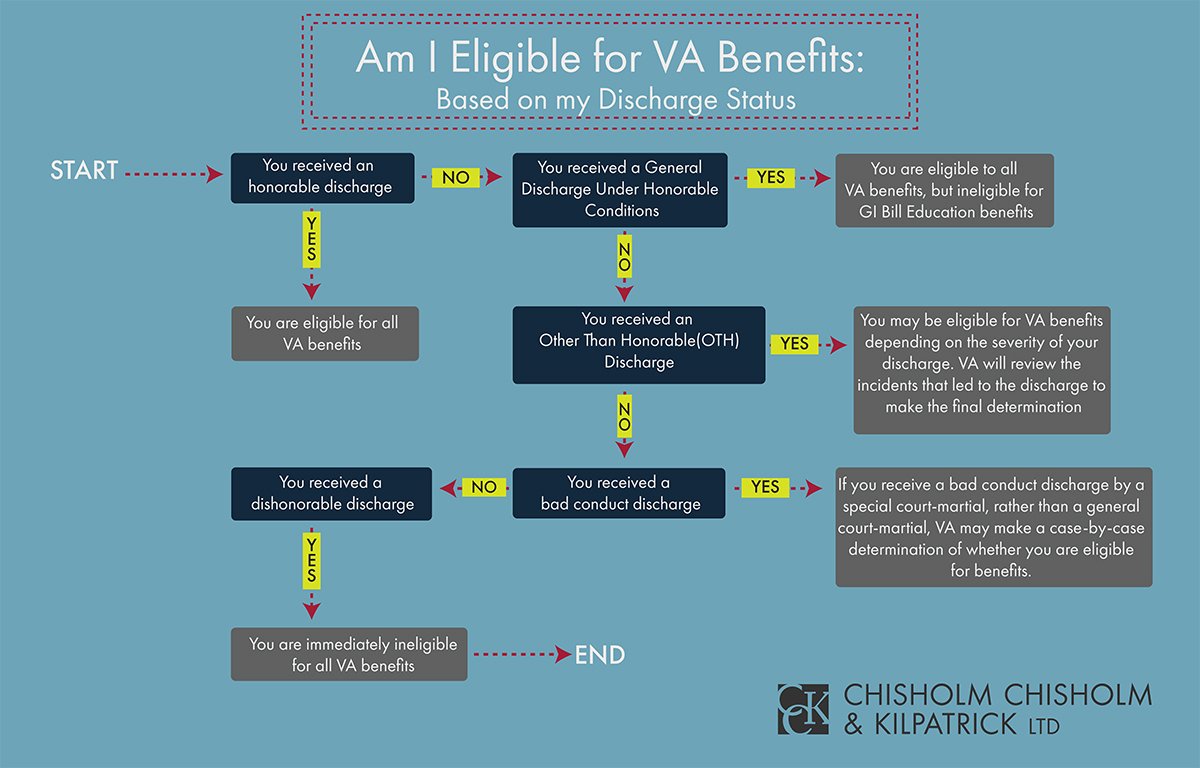Military Discharge Status and VA Disability Benefits

CCK Law: Our Vital Role in Veterans Law
Many veterans—and even some VA professionals—assume that “bad paper,” or a less-than-honorable discharge status from the military, automatically disqualifies individuals from accessing VA benefits like healthcare, disability compensation, and educational assistance. But although an other-than-honorable discharge status makes benefits much less likely, VA does make exceptions in certain cases. For example:
- If the veteran requests medical treatment or submits a disability compensation claim, VA can then evaluate the “character of discharge” on a case-by-case basis, and a favorable outcome may enable access to healthcare and other benefits. The circumstances of the discharge significantly influence the likelihood of success.
- As of June 25, 2024, factors like mental illness, traumatic brain injury, or other extenuating circumstances that led to less-than-honorable discharges can be grounds for a “compelling circumstances exception,” resulting in full VA benefits.
This article will discuss how discharge status affects VA benefits, what some exceptions are that may make veterans with other-than-honorable discharges eligible for benefits, and when legal and regulatory bars might exist to eligibility.
Types of Discharge Status and Effects on Eligibility
There are five categories of “characterizations of service” that a service member will usually find on their DD-214: honorable, general under honorable conditions, other than honorable, bad-conduct, or dishonorable.

Honorable Discharge
An honorable discharge is by far the most common, with roughly 85 percent of veterans receiving this type of discharge. Veterans with an honorable discharge are entitled to all VA benefits (e.g., disability compensation, educational, healthcare, vocational assistance).
General Discharge Under Honorable Conditions
General discharge means that the veteran met the requirements of service, likely with some minor disciplinary actions or failure to meet certain standards.
Veterans who receive general discharges under honorable conditions are entitled to all VA benefits except for GI Bill education benefits.
Other Than Honorable (OTH) Discharge
An OTH discharge is typically an undesirable discharge. It means the service member had some serious departures from the conduct, protocol, and performance expected of a service member.
Examples of situations that might result in an OTH discharge include security violations, serious misconduct that endangers other members of the military, or use of deliberate force to hurt another person.
Note that veterans have long reported misuse of OTH characterizations in cases where misconduct was linked to post-traumatic stress disorder, traumatic brain injury, military sexual trauma, or—before 2011—sexual orientation.
Even though this is an undesirable discharge, VA may consider eligibility for some benefits on a case-by-case basis through the character of discharge process.
Bad Conduct Discharge
A bad conduct discharge is a punitive, or disciplinary, discharge that is imposed by a court-martial. A court-martial is a criminal trial conducted by the military when there is a violation.
A bad conduct discharge typically results in the loss or limitation of certain veterans’ benefits like VA disability compensation and the GI Bill education benefits. But as with an OTH discharge, VA may determine eligibility for benefits after a character of service determination.
Dishonorable Discharge
A dishonorable discharge is usually reserved for veterans who have committed a very serious offense such as desertion, rape, or murder. Dishonorable discharges are only issued if you are convicted at a general court-martial that calls for dishonorable discharge as part of the sentence. Thus, if you receive a dishonorable discharge, you are immediately ineligible for all VA benefits.
Exceptions to Ineligibility to VA Benefits for Less-Than-Honorable Discharges
Character of Discharge or Character of Service Process
On a case-by-case basis, VA may determine that incidents that led to an other-than-honorable discharge were “under conditions other than dishonorable” and thus establish basic eligibility for VA benefits. This character of service determination is performed by the local VA Regional Office.
The onus, or responsibility, is on the veteran to initiate the case-by-case investigation.
Compelling Circumstances Exception
In early 2024, VA issued new rules regarding former service members who have been discharged for “willful and persistent misconduct” or an “offense involving moral turpitude” but who might be eligible for benefits due to a compelling circumstances exception.
To determine if a former service member might be eligible for a compelling circumstances exemption, VA will consider factors including but not limited to:
- Length and character of service
- Mental and cognitive impairment
- Physical health
- Combat-related hardship
- History of sexual abuse/assault or discrimination
Former service members who were previously found ineligible for VA care and benefits may reapply and now be found eligible.
Changing or Upgrading Military Discharge Status
Veterans looking to change or upgrade their discharge status can pursue a Discharge Review Board or the Board of Corrections of Military Records.
- The Discharge Review Board can look at discharge upgrade requests that were within 15 years of discharge from service. However, the Discharge Review Board can only look at upgrades for general, OTH, and special court-martial discharges. It cannot look at dishonorable or general court-martial discharges.
- The Board of Corrections of Military Records can look at discharge upgrade requests that fall beyond that 15-year period. It will look at the totality of circumstances, which is similar to what VA will look at (i.e., service, length of service, what happened, facts of the case). Here, individuals will need to do some advocacy and explain why the discharge was wrong either factually or legally.
As with character of discharge determinations, discharge upgrade determinations are all appealable within the right timeframes.
Legal and Regulatory Barriers to VA Benefits Eligibility
There are statutory and regulatory bars to benefits for veterans who committed certain infractions. If these circumstances exist in the veteran’s record, it is unlikely that they will receive benefits even through the exceptions described above.
Statutory Bars to Benefits
Under 38 USC § 5303, VA is prevented from granting entitlement to benefits if the reason for the veteran’s discharge constitutes a “statutory bar to benefits.” That is, if the incident(s) that led to separation or discharge are any of the following:
- Sentence of a general court-martial
- Being a conscientious objector who refused to perform military duty, wear the uniform, or otherwise comply with lawful orders of competent military authority
- Desertion
- Resignation by an officer for the good of the service
- Absence without official leave (AWOL) for a continuous period of 180 days or more, without compelling circumstances to warrant such prolonged unauthorized absence (as determined by VA)
- Requesting release from service as an alien during a period of hostilities
Regulatory Bars to Benefits
In addition to the statutory bars, there are also regulatory bars found under 38 CFR § 3.12(d). Individual’s character of discharge is considered to have been issued “under dishonorable conditions” if they were released under any of the following circumstances:
- Acceptance of an undesirable discharge to escape trial by general court-martial
- Mutiny or spying
- An offense involving moral turpitude (generally including the conviction of a felony)
- Willful and persistent misconduct
Does CCK Assist with Discharge Upgrades?
While discharge upgrades are not something that CCK typically handles, there is help available. Contact a VSO or find more information through Department of Veterans Affairs.
If VA denies your claim or you receive an unfavorable rating, you do have the right to appeal. CCK is the leading veterans law firm, with over 24,000 appeals in the last twenty-five years. Contact us as soon as possible after VA’s decision for a free case evaluation.
About the Author
Share this Post

